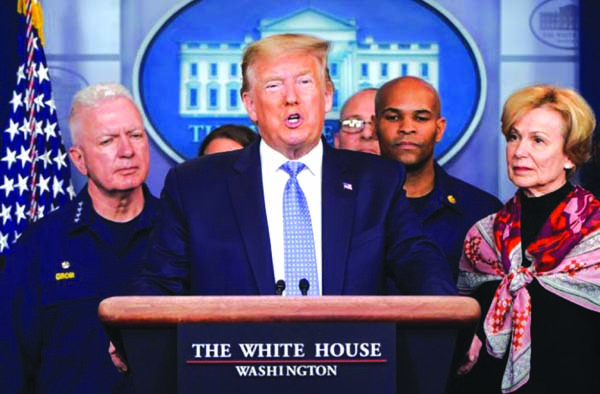
AP, Washington :
For the third time in three days, President Trump addressed the nation from the White House in an effort to address growing fears about the pandemic caused by the coronavirus, which has now infected about 3,200 Americans and killed more than 60.
“Beautiful day outside,” Trump said at the very outset of his remarks, referring to the nice weather that had residents of Washington, D.C., and other northeastern areas taking to the outdoors. With movie theaters, arts venues and-increasingly-restaurants and bars closed, and with large gatherings like sports events now canceled, there was little else to do.
“Take it easy,” Trump said. “Just relax.” The president appears to have been heartened by a Sunday afternoon announcement from the Federal Reserve that interest rates would fall to nearly zero. The central bank would also buy $700 billion in U.S. Treasury and mortgage securities in a dramatic step that recalled the 2008 housing crisis and the bailout of the financial industry that is generally credited with having kept the economy out of a depression.
Trump has been acutely concerned about the state of the economy, seemingly aware that his reelection prospects rest in large part on that single factor. But concerns across the nation appear to be more immediate than that. The weekend saw reports about the difficulty of attaining a coronavirus diagnostic test, as well as confusion about social distancing measures that some people seemed to take seriously and others did not. Though generally restrained, Trump did condemn what he called “fake news” reports about a Google coronavirus clearinghouse he had touted during Friday’s address from the Rose Garden. His promises about that website appear to have been well ahead of reality.
With a political personality built on cavalier machismo, Trump has struggled to provide the kind of empathy and fact-based reassurance that many Americans are plainly seeking. A longtime proponent of relentless optimism, he also struggled to tell Americans that difficult days could be ahead.
The last of these tasks fell to Dr. Anthony Fauci, the National Institutes of Health epidemiologist renowned for his efforts to fight HIV/AIDS in the 1980s. A member of the White House task force, Fauci said on Sunday that “the worst is yet ahead for us. It’s how we respond to that challenge that’s going to determine what the ultimate endpoint is going to be.” Fauci said that the window of the days to come will determine the severity of the outbreak in the United States.
For now, the primary question is about when Americans will be able to get a test where they live in a timely manner. The administration has spent about two weeks promising that both state-run and private labs would soon be testing hundreds of thousands, if not millions, of people.

